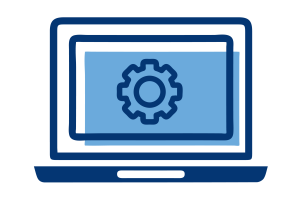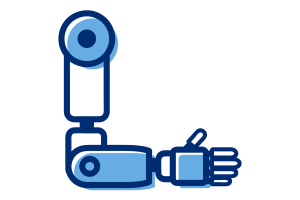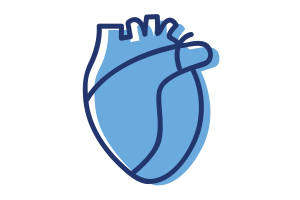Created by the faculty of our #1 nationally ranked biomedical engineering program for creative and critical thinkers like you, BMEI is an engaging college-level online asynchronous course where you’ll build on your knowledge of math, physics, and biology by solving real-world problems through hands-on technical projects. And you can earn three credits from Johns Hopkins University.
You’ll learn to model biological systems, design experiments to test them, and apply engineering principles to real-world medical and physiological challenges. You’ll collaborate with students from around the world who share your curiosity about biomedical engineering and gain valuable experience in a college-level learning environment. At BMEI, you’ll challenge yourself, gain confidence, and join a global community of young innovators.
Course Content and Projects
BMEI is your opportunity to explore the exciting intersection of biology, medicine, and engineering. Together with your classmates, you’ll investigate how engineers design and test solutions that improve health and advance medical care. With a balance of pre-recorded lectures and hands-on lab work, you’ll collaborate with students from around the globe, guided by supportive teaching assistants and instructors through office hours, peer reviews, and design feedback.
As you experiment, analyze, and present your ideas, you’ll start building the confidence and mindset of an engineer. Here are a few of the hands-on projects you’ll take on.
Arduino Project
Build and showcase your own biomedical sensor prototype using an Arduino microcontroller and lab accessories of your choice. Document your process and create a short demo video highlighting how your sensor works, its real-world uses, and its limitations.
Dynamic Arm Lab
Explore the biomechanics of motion! Analyze shoulder forces in static positions, then model how muscles and joints work together as the arm moves.
Cardiovascular System Lab
Design and test an electrical model of the human cardiovascular system. Experiment with factors that affect blood flow, simulate exercise effects, and explore how disease or injury impacts circulation.
Want a closer look? You can review past syllabi for detailed information about what is covered in the course, objectives, schedule, labs, grading deliverables, and more.
Program Format
BMEI is offered every fall, spring, and summer, giving you the freedom to choose the semester that works best for you. Because it’s asynchronous, you’ll have the flexibility to learn on your terms, whether that’s after school, on weekends, or from anywhere in the world.
Online Asynchronous: Learn from Anywhere, Stay Connected
BMEI immerses you in an interactive online environment. While you apply biomedical engineering concepts through college-level experiments, you’ll connect with students worldwide who share your passion. By the end of the course, you’ll leave with the confidence to pursue biomedical engineering as a major and college credit from one of the world’s most notable universities.
Flexible but structured. You’ll watch pre-recorded lectures on your own schedule and meet regular deadlines that keep you moving forward. Optional twice-weekly study sessions and virtual design reviews with your instructional staff provide extra support.
Year-round: Achieve your goals, on your schedule
Whether you are balancing a busy school year or ready to dive in over the summer, BMEI is designed to fit into your daily life. The flexible, primarily asynchronous format lets you learn when it works best for you, supported by clear deadlines and chances to connect along the way.

| Session | dates | location & Class Times |
|---|---|---|
| Fall Session | August 25 to December 5, 2025 (14-16 weeks) | Online · Asynchronous with deadlines · Optional study sessions 2x/week |
| Spring Session | January 20 to April 27, 2026 (14-16 weeks) | Online · Asynchronous with deadlines · Optional study sessions 2x/week |
| Summer Session | June 22 to July 31, 2026 (6 weeks) | Online · Asynchronous with deadlines · Optional study sessions 2x/week |
Eligibility
BMEI carries the expectations of a Johns Hopkins college course, so you’ll need to meet specific requirements before you apply.
Academic Prerequisites
- As and Bs in your high school math and science classes
- Completed Algebra II
- Completed a course where the trigonometric functions are taught. You must be able to use sine, cosine, tangent, and the Pythagorean Theorem to determine angles and side lengths for right triangles.
- Completed a full year of high school physics, including a lab. You need to be comfortable with drawing and calculating forces in free-body diagrams, equations of motion, and principles of electric circuits prior to taking BMEI. (A score of 4 or 5 on the AP Physics 1 exam may be used instead of the high school physics requirement.)
Grade and age requirements
You must be a current high school student or recent high school graduate.
Our typical student is a rising junior (~35%) or senior (~65%) in high school. Talented ninth-graders (rising sophomores) may be considered; however, when space is limited, priority will be given to older students. Graduated seniors are also eligible to participate during the summer before they begin their college career.
What to Expect Day to Day
Here’s how the course is structured, how much time you’ll spend on projects, and what you’ll need to get started.
Course Modality, Structure, and Expectations
This course is not self-paced. BMEI Online is primarily asynchronous, allowing you to manage your time flexibly; however, you will need to meet frequent deadlines for assignments, projects, and quizzes.
- Lectures: All lectures are pre-recorded, so you can watch them at any time. You are expected to view a specific video on the first day of each module but may revisit it for clarification. Please note that there are regular deadlines for assignments throughout the course.
- Study Sessions: Regular, real-time study sessions are held at least twice a week on Zoom. These optional sessions may be recorded and shared for later access. Additionally, you can request to meet with your instructor or TA outside of the scheduled sessions at a mutually convenient time.
- Design Reviews: You will complete an independent project that requires at least three virtual design review meetings with your instructor. Each meeting typically lasts 15 to 20 minutes. Your instructor will publish a list of available days and times for these reviews, and you will be able to sign up for a session that works best for you.
- Collaboration: You will also use Canvas to interact with your classmates and ask questions. All students are encouraged to post questions in Canvas for your course instructor and TAs. Instructors and TAs will respond to student inquiries within 24 hours.
Engineering Innovation courses are designed to mirror college-level work. As a result, you may find the course expectations to be an adjustment if you’re used to high school coursework. You’re encouraged to use the support resources available to you and to reach out to your instructor or advisor whenever you need help.
Time Commitment
Engineering Innovation courses are designed to mirror college-level work. As a result, you may find the course expectations to be an adjustment if you’re used to high school coursework. You’re encouraged to use the support resources available to you and to reach out to your instructor or advisor whenever you need help.
As a participant in the BMEI program, you’ll take on a college-level curriculum that requires steady weekly engagement. Expect to spend 14–20 hours per week during the summer term and 7–10 hours per week during the fall or spring term.
At Johns Hopkins, first-year biomedical engineering students complete this same course over a 16-week fall semester. As a pre-college student, you’ll cover the material more quickly, in just 6 weeks during the summer or 14 weeks in the fall or spring.
While the course is primarily asynchronous, you’ll need to manage your time carefully. Consider your other commitments (such as jobs, internships, sports, or additional coursework) before enrolling to ensure you can keep up with the pace.
How Your Time Breaks Down
Lectures & Quizzes: 4–6 hours/week in summer; 2–3 hours/week in fall & spring
Homework: 4–6 hours/week in summer; 2–3 hours/week in fall & spring
Lab Projects & Reports: 6–8 hours/week in summer; 3–4 hours/week in fall & spring
Computer and Lab Requirements
Computer Requirements
To participate in the program, you’ll need a computer that can access course materials on the Canvas learning management system.
-
Browser: Canvas works best with the latest version of Firefox or Chrome. For the smoothest experience, we recommend enabling third-party cookies in your browser.
-
Software & Hardware:
-
Ability to install Arduino software
-
USB port to connect with the Arduino
-
Reliable internet connection
-
Ability to record videos of your course projects and upload them to Canvas
-
Required Lab Supplies
When you receive your admission offer, you’ll get instructions on how to order the required lab kit from our official vendor.
-
Cost: See our Cost & Aid page for lab kit pricing. The vendor will add U.S. sales tax and shipping fees when you place your order.
-
International Orders: Students outside the U.S. are also responsible for any customs taxes, tariffs, or duties in addition to international shipping fees. Please allow at least two weeks for shipping, though customs delays can extend delivery time. Be sure to track your package using the vendor’s information so you’ll know if you need to pick it up from customs or the shipping company.
“I knew Hopkins and biomedical engineering were two things that I wanted, but this program really solidified that. It gave me that confirmation of, ‘this is what I want to do for the rest of my life.’ It was one of the biggest things I gained from BMEI. ”
 Oliver
A Biomedical Engineering Innovation Alum
Oliver
A Biomedical Engineering Innovation Alum
ISPEED in BME
If you are interested in biomedical engineering, but have not taken all the courses necessary to participate in Biomedical Engineering Innovation, you may be interested in attending ISPEED-BME, a program offered by the JHU Department of Biomedical Engineering.
JOIN US!
Learn about each program or start your application today.




